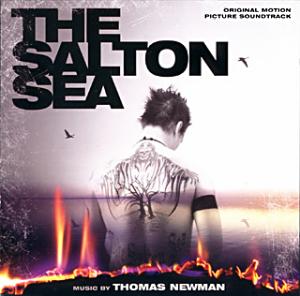Thomas NEWMAN
The Salton Sea
OST
VARÈSE SARABANDE VSD-6351

Superficially this score for the Val Kilmer thriller, being hailed in some quarters as this year's Memento, is similar to John Powell's work on The Bourne Identity, which I also review this month. Both scores combine string orchestra with electronics, though where Powell takes a very obvious dance route Thomas Newman's writing is guided by much more sophisticated lights; jazz, minimalism and avant garde left-field rock. He also employs a raft of excellent musicians as soloists, artists playing a remarkable range of conventional and esoteric instruments and devices. Most notable of the soloists is the great jazz trumpeter Terence Blanchard, himself a distinguished film composer, guesting on a version of Gil Evan's "Saeta". Apart from a final short bonus track taken from "the instructional CD Learn to Yodel" (and yes, it really is yodelling lesson) the remainder of the disc is Newman all the way, with the composer on piano and the other musicians handling acoustic and electric guitars, distorted mandolin, sitar, timpani rings, drum loops, tamboura, shiver tablas, war stick, extended mouthpiece, ewi (electronic wind instrument), saxophone, sampled voice, electric organ, phonograph, gone pulse, amplifier, resonating metals, prepared steel guitar, flutes and layered drones.
Tonal without being particularly melodic, and rhythmic though largely avoiding the endless variations of American Beauty (1999) Newman has spun out for the past two years, this is the composer's most creative and imaginative score in some time. It won't do a thing for those who insist all scores should follow the "golden age" big orchestral route, but the orchestrations alone are remarkable and the sound is so clear and detailed as to allow every detail to shine. The opening "Perpetual Night Party" catches the attention with a driving art-rock pulse before surrendering to atmospheric acoustic guitar stating the film's low key main theme. "Tweaker Crash" is as close as the score comes to the now well over used American Beauty marimba patterns before Newman heads off into unsettling ambient territory with "Undress Revised", the beginning of a journey which encompasses a wide variety of colours, textures and moods from the menacing to the sultry. It all comes full circle with "Walk to Black", completing an experimental score which may not get played too often but which offers an intriguing collection of soundscapes and musical visions pitched somewhere between Angelo Badalamenti's work for David Lynch and Peter Gabriel's scores for Birdy (1985) and The Last Temptation of Christ (1989).
Gary S. Dalkin

Return to Index